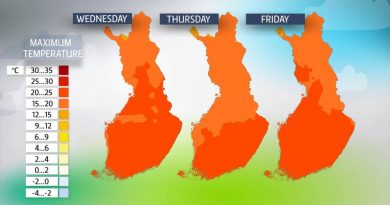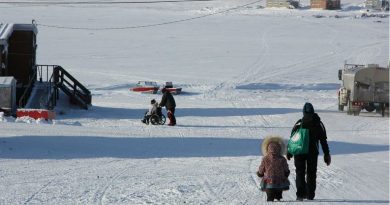Russia’s Arctic research vessel Severny Polyus drifting towards Franz Josef Land

After 16 months of drift with the currents, Russia’s Arctic research vessel Severny Polyus has course for the waters between the archipelagos of Franz Josef Land and Svalbard. It was previously anticipated that the ship would end up further west in the Greenland Sea.
The ship that set out on its maiden voyage in early October 2022 was the first week of January located at 83° straight north of the Franz Josef Land.
According to expedition leader Kirill Filchuk, the drift might ultimately end up in the area between the archipelagos of Franz Josef Land and Svalbard.
“Until recently, it was expected that the drift would bring us to the Fram Strait. An exit into the area of Franz Josef Land looked like a more unlikely alternative. But lately, we have circled in the waters north of this archipelago, which by itself is an interesting result,” Filchuk said to newspaper Rossiiskaya Gazeta.
The Severny Polyus (North Pole) has the characteristic shape of a bathtub and is also referred to as an ‘Arctic platform.’ It is Russia’s new unique floating base for Arctic research.
Previously, Russian annually organised research expeditions on drifting ice floes. The rapid warming in the region ultimately put a stop to those expeditions in 2012.
Voyage repeatedly extended
The Severny Polyus was completed by the Admiralty Yard in St.Petersburg in early 2022, and set off for its maiden voyage that same fall.
The voyage has repeatedly been extended and is now due to continue until spring 2024.
It has been an Arctic odyssey for many of the expedition members. There have been several crew changes, but as much as 80 percent of the expedition members have been on board since the start of the voyage, RG.ru informs.
The Severny Polyus has a crew of 16 and a research team of 34.
When Fridtjof Nansen made his historical expedition with the Fram in 1893-1896 he ended up on the northwestern tip of Svalbard.
Upcoming Severny Polyus 42 due to start in fall 2024
Several later expeditions have also indicated that drifting would end up west of Svalbard.
Today’s expedition is named Severny Polyus 41 and builds on the experience of the former forty ice floe expeditions.
An upcoming Severny Polyus 42 is due to start in fall 2024.
The vessel is operated by the Russian meteorological service Roshydromet and is capable of undertaking geological, acoustic, geophysical and marine research under the harshest of Arctic conditions. On board are 15 labs where researchers can work year-round.
Albeit built for research purposes, the vessel could ultimately also be applied by the Russian military. The country’s new Marine Doctrine includes a high stress on use of civilian ships and infrastructure for military purposes. That could include not only trawler and icebreakers, but also the Severniy Polus.
Related stories from around the North:
Antarctica: Could snow cannons in Antarctica help avert catastrophic sea level rise?, Eye on the Arctic
Canada: What an ice-free Arctic really means, and why it matters so much, CBC News
Denmark: Documentary will show climate change through eyes of pioneering scientist, Blog – Mia Bennett
Greenland: July may surpass hottest month in recorded history says World Meteorological Organization, Eye on the Arctic
Iceland: Iceland glacier lost to climate change to get memorial ceremony this month, Eye on the Arctic
Norway: Climate change is about to divide Norway’s largest Arctic island, The Independent Barents Observer
Russia: September’s Arctic sea-ice on track for second lowest on record, Eye on the Arctic
United States: New study predicts ‘radical re-shaping’ of Arctic landscape by 2100, CBC News



